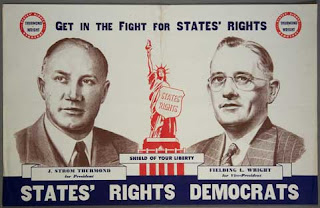Worst American Birthdays, vol. 33
 Strom Thurmond, one of the US Senate’s greatest sexual profligates and enduring racist icons, was born 105 years ago today.
Strom Thurmond, one of the US Senate’s greatest sexual profligates and enduring racist icons, was born 105 years ago today.
As the Democratic governor of South Carolina, Thurmond joined fellow Negrophobe Fielding Wright — a Democratic Congressman from the governor of Mississippi — in a protest campaign intended to unseat fellow party member Harry Truman from the presidency in 1948. Truman, hoping to keep liberal voters from migrating to Henry Wallace’s Progressive Party, had nudged the Democrats ever so gently away from its 19th century herrenvolk roots, mostly by establishing a presidential commission to investigate the condition of civil rights in the US. Fearful that Truman would devote a second term to more specific, concrete devaluations of white privilege, nearly three dozen party delegates left the Democratic convention in Philadelphia and recast themselves under Thurmond’s leadership as the States’ Rights Democratic Party.
Warning that civil rights was the first step toward the creation of a “Police Nation” in the US, Thurmond rallied the Dixiecrats, who insisted that the nation’s “racial integrity” be preserved through segregation and anti-miscegenation statutes. Warning that the “nigger race” would never be admitted into his theaters, swimming pools, homes and churches — he of course had little to say about the rules of entry to his bedroom — Thurmond called upon the federal government to cease its interference with “individual rights” by mandating equality, a principle the party adamantly rejected.
Although the States’ Rights campaign failed in 1948, it did manage to dislodge four states from the “solid South,” taking South Carolina, Alabama, Louisiana and Mississippi and nearly tossing the presidency to Thomas Dewey. Over the next several decades, the 1948 Dixiecrat walkout would be duplicated on a wider scale. As the national civil rights movement crested with the support of Democrats like Lyndon Johnson, Thurmond himself switched to the GOP and campaigned for Barry Goldwater and Richard Nixon. From the 1960s through the 1980s, disgruntled Southern white voters followed Thurmond and gradually migrated to the Republican Party, whose revanchist racial politics aimed to roll back the impact of a civil rights movement that Thurmond and others had been unable to prevent in the first place.
Over the rest of his career, Thurmond acquired an almost completely undeserved reputation as a convert to the mission of racial equality. Although he occasionally and vaguely congratulated African Americans for “developing” beyond the condition of menial servitude, he never actually repudiated his segregationist views, and his few moments of “enlightenment” — voting, for instance, to honor Martin Luther King, Jr., with a federal holiday — hardly compensate for his decades of sturdy labor on behalf of white supremacy.
During the summer of 2003, Thurmond at last ascended to the great Whites Only swimming pool in the sky, several months after the most notorious birthday party in his unnecessarily long life.



